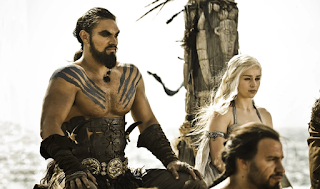Daenerys, the White Feminist
In the Fall of
2015, I took a course entitled Latin America in 21st Century taught
by Dr. Victoria Cummins. This class essentially worked as a survey course of
Latin America though it did (as its name suggests) focus particularly on more
modern issues including political, racial, and gendered issues. We read an autobiography
Let Me Speak!: Testimony of Domitila, A
Woman of the Bolivian Mines for the course by Domitila Barrios de Chungara,
the wife of a Bolivian tin miner. The focus of the story was on her experiences
as a working class, miner’s wife in Bolivia who organized women in the mining
community around her while dealing with capitalist exploitation of the mines.
Of all the stories which we read, one which stuck out to me was when she discussed
the International Women’s Year Conference in 1975. Here, she was confronted
with just how different the issues she dealt with were from what others were
dealing with and she felt she very clearly did not belong. What was an instance
in which she felt she didn’t belong can be labeled as an instance of white
feminism.
As defined by Wikipedia,
“white feminism is a form of feminism that focuses on the struggles of white
women while failing to address distinct forms of oppression faced by ethnic
minority women and women lacking other privileges”. While many of the women at
the conference were focusing on sexual issues related to feminism and not being
oppressed by men, they failed to address the privileges they had compared to Domitila
who had different issues such as food and shelter as well as making ends meet
period to survive which she had to focus on – issues which white, middle class
women did not necessarily even need to think about.
In Game of Thrones, Dany, the extremely
white mother of dragons and freer of slaves (or specifically people of color) comes
off in a very similar light. Sure, it’s great that she thinks slavery is bad,
but how often does she truly address the issues which affect the people of
color after she frees them? How often does she truly think about whether they’re
loyal to her because they love her or because she’s just a better option to
direct slavery? Or even about what would actually be helpful to them as opposed
to just doing whatever she can to get a throne she feels entitled to?
She is even confronted with her own white feminism when she is able to walk freely around and view the aftermath of a battle. Other women are killed and raped and she has the power to stop it. She sees this happening and yes she does something, she offers a crappy alternative: the women may get married to men who raped them?? She does this and then expects gratitude from the women including Miri Mazz Durr who calls her out on her privilege and her naivety. Instead of assessing it she burns her and later in the series she frees more slaves who are all now somehow completely grateful ?
 |
| Like okay really |
The entire image
of a white woman freeing thousands of people of color from their oppressors who
are then so thankful for her help that they refer to her as their mother is troubling
in itself as well as perhaps a perfect visual of white feminism. Her storyline
is one which troubles me and one which sadly is not exactly surprising when her
character is written by a white man who I’m sure has never given a thought to,
much less heard of intersectional feminism.
-Zoe Lugo





From the beginning, Daenerys didn't really want to save the Unsullied, she wanted to use their brute force to win the crown. She only finds them useful when they have something to give her, this time being their fighting force and ultimately, their lives. She uses military force to get what she wants, encourages insurgency and ignores the customs and culture of the people she’s governing, until it’s useful for her conquest. I agree with your view that Daenerys liked to see herself as the “white savior” for freeing the slaves (but not really). Daenerys expects everyone she frees to be loyal to her and views them as her children.
ReplyDelete